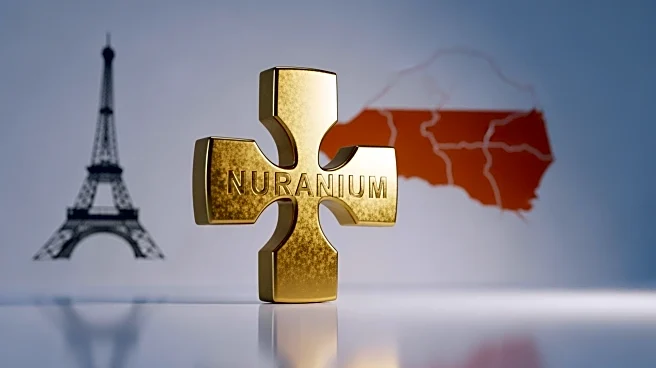What's Happening?
Niger's military junta is reportedly negotiating the sale of approximately 1,000 metric tons of uranium to Russia's state-owned nuclear company, Rosatom. This deal, valued at around $170 million, involves
yellowcake uranium stockpiled at the Arlit mine in northern Niger. The site was previously operated by the French nuclear firm Orano, which ceased operations following a coup in July 2023 that brought General Abdourahamane Tiani to power. Since then, the junta has taken control of key mining assets, ending decades of French involvement in Niger's nuclear sector. The proposed uranium sale to Russia marks a significant shift in Niger's geopolitical alliances, moving away from France and towards Moscow.
Why It's Important?
The uranium deal signifies a major geopolitical shift in the Sahel region, potentially diminishing French influence while strengthening Russia's presence. France, which previously relied on Niger for up to 15% of its uranium needs, faces strategic and security challenges as Niger aligns more closely with Russia. The transportation of uranium through regions controlled by militant groups poses additional security risks. This development could alter the balance of power in the region, affecting international relations and energy security. The move also highlights Niger's intent to assert sovereignty over its resources and reduce Western influence.
What's Next?
The uranium is expected to be transported by a convoy of about 30 trucks through Burkina Faso to the port of Lomé in Togo by the end of November, where it will be shipped to Russia. This route poses significant security risks due to the presence of militant groups. French officials have expressed concerns over the strategic and security implications of this deal. The situation may prompt France and other Western nations to reassess their strategies in the region, potentially leading to diplomatic efforts to counterbalance Russia's growing influence.
Beyond the Headlines
The uranium deal reflects broader geopolitical trends, with Niger and other Sahel nations increasingly turning to Russia for support. This shift could have long-term implications for regional stability and international relations. The move away from Western influence may also impact economic development and security cooperation in the region. Additionally, the deal raises questions about the ethical and environmental implications of uranium mining and transport in politically unstable areas.











